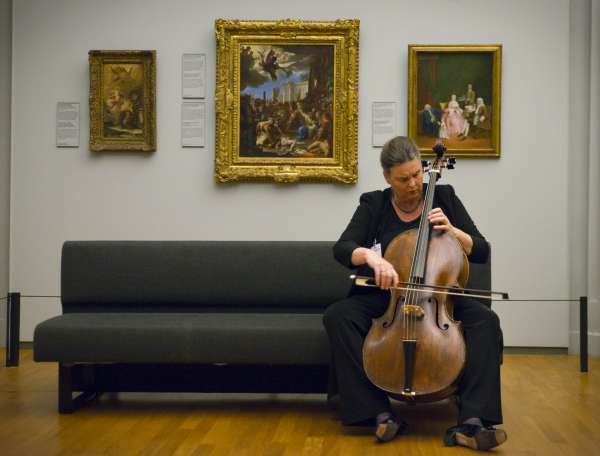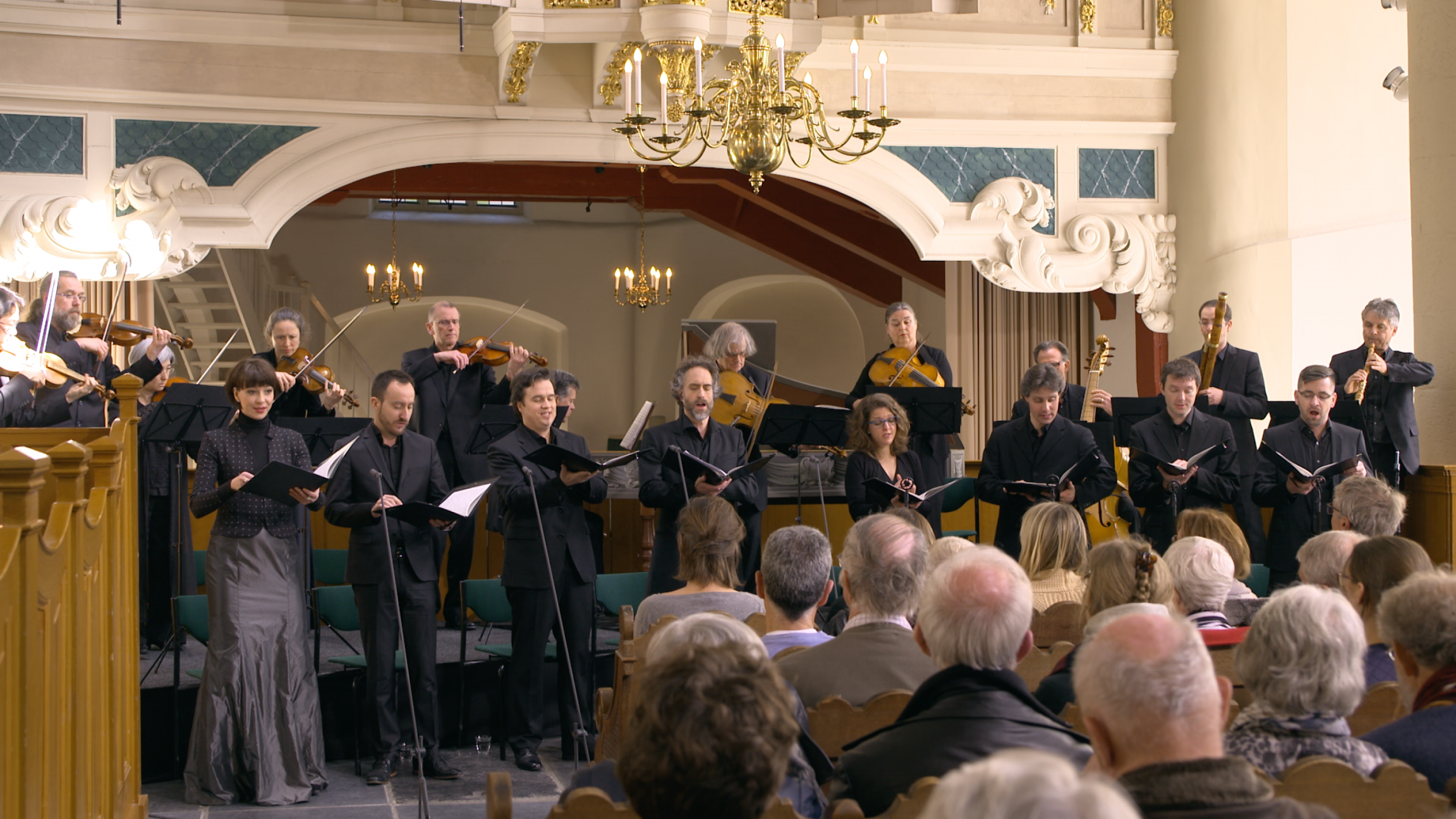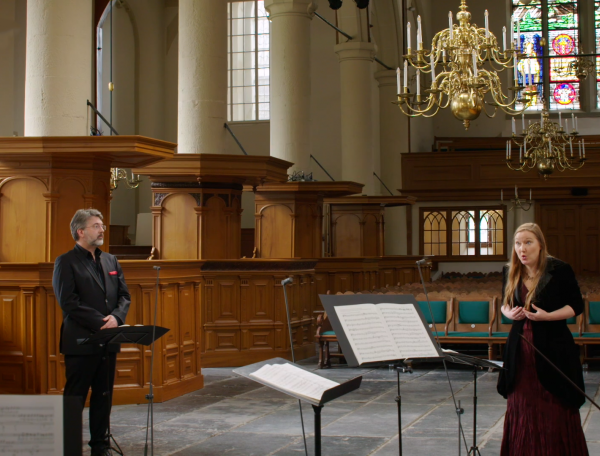

Jesus nahm zu sich die Zwölfe
BWV 22 performed by the Netherlands Bach Society
conducted by Sigiswald Kuijken
Walloon Church, Amsterdam
Behind the music
No frivolities
Was Bach trying to suit prevailing musical tastes in Leipzig in this audition cantata?
Bach wrote this cantata as an ‘audition piece’. He was applying for the position of cantor of the Thomaskirche in Leipzig, and part of his application procedure was to perform two cantatas he had written himself. The starting point for these compositions was, of course, the words, which had been sent to his home beforehand and which he would have used as his basis. But there is discussion about whether he tried his best to please the council in Leipzig. Conductor Sigiswald Kuijken believes this was not the case, whereas others claim that these cantatas do show that Bach tried to suit prevailing musical tastes in Leipzig.
They think this is demonstrated, for instance, by the fact that he did not go over the top regarding virtuosity, as he did not yet know exactly how good the musicians in Leipzig were. Or by the lack of arias in which the opening is repeated at the end and the absence of recitatives with only continuo accompaniment. This sort of da capo aria and secco recitative were commonly used in opera, and some members of the Leipzig council believed that church music should not be interlaced with theatrical frivolities.
The fact that Bach certainly based his composition on the words is demonstrated in the first movement. He divides the reading from the Gospel of St Luke into three parts, respectively introducing a narrator, the bass who sings Vox Christi and then the whole ensemble, who express the amazement of the disciples in a fugue.
Extra videos
Sigiswald Kuijken
"It is top-quality music, but it would have been the same if it hadn't been a test piece."
Sigiswald Kuijken and Lucia Swarts
"Especially for this concert Lucia Swarts learned to play the violoncello da spalla."
Vocal texts
Original
1. Arioso (Tenor, Bass, Chor)
Jesus nahm zu sich die Zwölfe und sprach:
Sehet, wir gehn hinauf gen Jerusalem,
und es wird alles vollendet werden,
das geschrieben ist von des Menschen Sohn.
Sie aber vernahmen der keines
und wussten nicht, was das gesaget war.
2. Arie (Alt)
Mein Jesu, ziehe mich nach dir,
ich bin bereit, ich will von hier
und nach Jerusalem zu deinen Leiden gehn.
Wohl mir, wenn ich die Wichtigkeit
von dieser Leid- und Sterbenszeit
zu meinem Troste kann durchgehends wohl verstehn!
3. Rezitativ (Bass)
Mein Jesu, ziehe mich, so werd ich laufen,
denn Fleisch und Blut
verstehet ganz und gar, nebst deinen Jüngern nicht,
was das gesaget war.
Es sehnt sich nach der Welt
und nach dem größten Haufen.
Sie wollen beiderseits, wenn du verkläret bist,
zwar eine feste Burg auf Tabors Berge bauen
hingegen Golgatha,
so voller Leiden ist,
in deiner Niedrigkeit mit keinem Auge schauen.
Ach! kreuzige bei mir in der verderbten Brust
zuvörderst diese Welt und die verbotne Lust,
so werd ich, was du sagst,
vollkommen wohl verstehen
und nach Jerusalem mit tausend Freuden gehen.
4. Arie (Tenor)
Mein alles in allem, mein ewiges Gut,
verbessre das Herze, verändre den Mut;
schlag alles darnieder,
was dieser Entsagung des Fleisches zuwider!
Doch wenn ich nun geistlich ertötet da bin,
So ziehe mich nach dir in Friede dahin!
5. Choral
Ertöt uns durch dein Güte,
erweck uns durch dein Gnad;
den alten Menschen kränke,
dass der neu' leben mag.
Wohl hie auf dieser Erden,
den Sinn und all Begehren
Und G'danken hab'n zu dir.
Translation
1. Arioso (Tenor, Bass, Chorus)
Jesus took aside the twelve [disciples] and said:
See, we are going up to Jerusalem,
and all will be fulfilled that is written [by the prophets]
about the son of man.
But they apprehended none of this, and did not
discern what was said [about Jesus’s death].
2. Aria (Alto)
My Jesus, draw me after you;
I am ready; I wish to go from here
And to Jerusalem for your sufferings.
Well for me if I can understand the weight [of glory]
From this time of suffering and death
Thoroughly well for my consolation.
3. Recitative (Bass)
My Jesus, draw me [after you]; so will I run [the race of faith]; For flesh and blood
does not understand well and truly, along with your disciples, what was said [about your death].
It [flesh and blood] craves the world,
and the greatest throng;
They [your disciples] wish, when you are transfigured,
Indeed to build, along either side [of you], a secure fortress on Tabor’s mountain; Golgotha, on the other hand, so full of suffering In your humiliation,
[they wish] not to see with their eyes.
Ah, crucify in me, within my corrupted breast,
Above all, this world and forbidden pleasure;
Thus will I perfectly well
understand what you say,
And go to Jerusalem with a thousand joys.
4. Aria (Tenor)
My all in all things, my eternal good:
Reform my heart, transform my mettle;
Strike down all
That is opposed to this renunciation of the flesh.
But now when I am spiritually put to death here [on earth], Then draw me after you, into peace, there [in heaven].
5. Chorale
Put us to death through your goodness;
Raise us [from the dead] through your grace;
Mortify the Old Adam [within us],
That the New [Adam within us] may live
Here on this earth as well,
And have his disposition and all desires
And thoughts be toward you.
transl. © Daniel R. Melamed and Michael Marissen
For the annotated version of the text and translation, see here.
Credits
-
- Release date
- 29 July 2016
-
- Recording date
- 23 April 2016
-
- Location
- Walloon Church, Amsterdam
-
- Violoncello da spalla and direction
- Sigiswald Kuijken
-
- Soprano
- Miriam Feuersinger
-
- Alto
- Damien Guillon
-
- Tenor
- Wolfram Lattke
-
- Bass
- Christian Immler
-
- Ripieno soprano
- Griet de Geyter
-
- Ripieno alto
- Barnabás Hegyi
-
- Ripieno tenor
- Kevin Skelton
-
- Ripieno bass
- Sebastian Myrus
-
- Violin 1
- Shunske Sato, Pieter Affourtit
-
- Violin 2
- Sayuri Yamagata, Anneke van Haaften
-
- Viola
- Staas Swierstra
-
- Violoncello da spalla
- Lucia Swarts
-
- Violone
- Robert Franenberg
-
- Oboe
- Martin Stadler
-
- Bassoon
- Benny Aghassi
-
- Trumpet
- Robert Vanryne
-
- Organ
- Leo van Doeselaar
-
- Harpsichord
- Siebe Henstra
-
- Director and editor
- Bas Wielenga
-
- Music recording
- Guido Tichelman, Bastiaan Kuijt, Pim van der Lee
-
- Music editor
- Guido Tichelman
-
- Camera
- Jochem Timmerman, Martin Struijf, Merijn Vrieling, Chris Reigelt
-
- Lights
- Zen Bloot, Gijs 't Hoen
-
- Score reader
- Ferenc Soeteman
-
- Video engineers
- Vincent Nugteren, Justin Mutsaers
-
- Camera assistants
- Robert Wijermans, Leon Mignon
-
- Set technicians
- Justin Mutsaers, Chris Reichgelt
-
- Data handling
- Jesper Blok
-
- Project manager
- Peter Ribbens
-
- Interview
- Onno van Ameijde
-
- Producer
- Marco Meijdam, Imke Deters, Jessie Verbrugh
-
- Acknowledgements
- Nienke Meuleman

